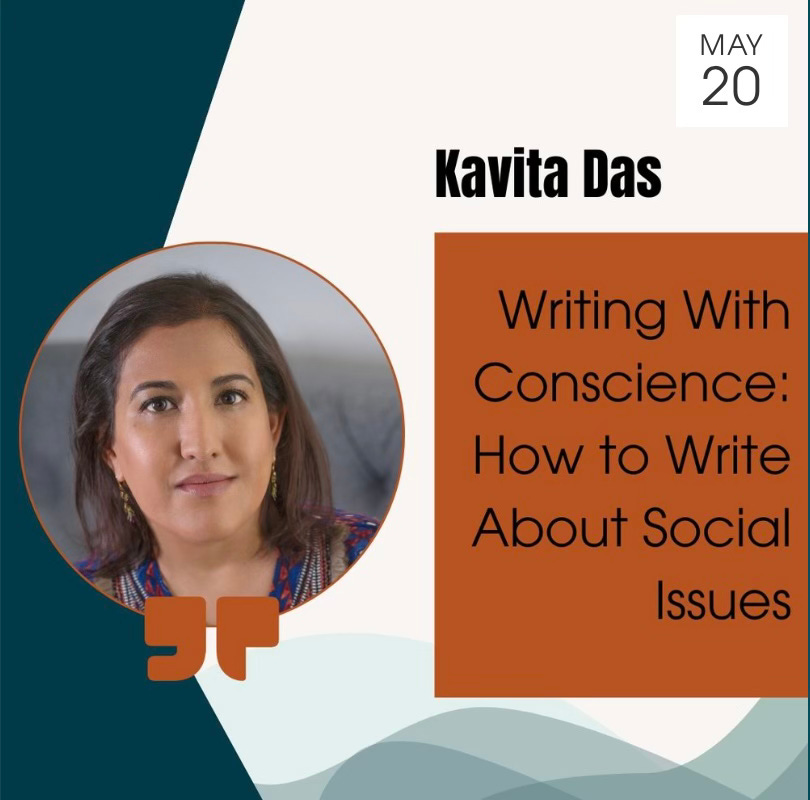Today we are delighted to feature an interview with Kavita Das who is leading our last guest instructor class for the spring: Writing With Conscience: How to Write About Social Issues on Tuesday, May 20 from 6 to 9 pm ET, online. Availability is limited, so register now! This is an important and increasingly timely session for anyone writing in long form or short form about social issues. And Kavita’s insights and guidance are really valuable. We all need to be using our voice as much as possible, in as productive a way as possible.
Kavita worked in social change for close to fifteen years, addressing issues ranging from community and housing inequities, to public health disparities, to racial injustice. Ten years ago she pivoted to writing. At the root of both her writing and social change work is Kavita’s desire to provoke thought and engender change by recognizing and revealing the true ways in which culture, race, and gender intersect especially when it comes to societal inequities.
Our intern, Talia Deitsch, conducted this interview with Kavita.
TD: What first drew you to writing? A particular author or piece? Or was the drive always there?
KD: I didn’t become an avid reader until I was in my 20s and that sparked my desire to write. I took my first writing class around age 30 and soon after joined a South Asian American women's writing group which encouraged me to continue writing even as I was working full-time in social justice. In my work, I was writing policy briefs and op-eds, and outside of work I was writing about my identity and experiences, and eventually the two melded together.
TD: What prompted you to make the switch from championing social justice in the field to doing it as a full-time writer?
KD: When I was working full-time, I spent my days addressing how racial injustice works writ large. In my writing I began reflecting on the quieter ways racial injustice works to erase the lives, experiences, and contributions of those on the margins. This is what motivated me to write the life story of Lakshmi Shankar, the most prominent female Indian singer to bring Indian music to the West in the 1960s, yet whose story was overshadowed. I see my writing as a quieter and less direct aspect of my social justice work, more focused on shifting culture and attitudes than policies and practices.
I began reflecting on the quieter ways racial injustice works to erase the lives, experiences, and contributions of those on the margins.
TD: How has teaching shaped your life and life goals? Has it changed your perspective or motivations?
KD: I created my Writing with Conscience/How to Write About Social Issues class almost ten years ago when Trump first became president. I was being asked for advice from fellow writers about how to write about social issues, and I realized there were distinctions between writing from a journalistic perspective versus a deeply personal one. My goal was to create more writers of conscience, who were engaging with social issues in meaningful ways. It’s hard to believe that it’s been almost 10 years! In 2020, I began writing Craft and Conscience: How to Write About Social Issues because I believed it could reach more people and be used as a guide and teaching tool. My students have ranged from experienced writers to beginners and have come from such varied backgrounds and experiences. I’m so inspired by their work on and off the page. Last week I got to moderate a book launch event for a former student, and that was an amazing feeling!
I realized there were distinctions between writing from a journalistic perspective versus a deeply personal one.
TD: Trying to change someone’s mind can seem an impossible task. Knowing that, what do you hope people will take away from your writing—and what do you hope students will take away from your class?
KD: Honestly, coming to writing from working for social justice, I had initially set lofty goals for myself—I wanted to change people’s minds. But given how divided we are in this moment and how entrenched people are in their views, I think it is too heavy a lift. Instead, my suggestion to myself and other writers is to set a more realistic goal of providing readers with an alternate perspective, one that they might not have encountered and that could push them to want to learn more and consider the issue in a broader way. When we set goals that are too lofty, we risk getting burned out and having writing transform from a source of inspiration and solace to a burden.
TD: Compassion towards others is vital, but so is kindness towards yourself. How do you like to unwind? When was the last time you took yourself on an artist’s date?
This is so true! Compassion for yourself and your writing starts with remembering that your writing is first and foremost for yourself—a space for helping you process your thoughts and feelings about the world and expressing your unique perspective. One of the ways I replenish myself as a writer, especially in these troubling times, is by reminding myself that I am part of a tradition of artists, past and present, who have wrestled with challenging social issues. Just this past week I attended an amazing book launch event for women of color writers hosted by a woman of color artist. It was a powerful reminder of why artists are crucial as chroniclers and instigators of social change.
Register here.
Kavita Das writes about culture, race, gender, and their intersections. Kavita’s work has been published in Wired, CNN, Teen Vogue, Catapult, Fast Company, Tin House, Longreads, The Atlantic, The Washington Post, Los Angeles Review of Books, Kenyon Review, and many other places. Kavita’s second book, Craft and Conscience: How to Write About Social Issues (Beacon Press, October 2022), is inspired by the Writing with Conscience class she created and teaches. Her first book, Poignant Song: The Life and Music of Lakshmi Shankar, was published by Harper Collins India in 2019. She lives in New York with her husband, 5-year-old and two rescue dogs.
Talia Deitsch is a private chef living outside of Boston. She has studied fiction and screenwriting at Harvard and is a longtime devotee of GrubStreet. She has been published in LEON Literary Review and North Dakota Quarterly and will shortly join Year 15 of Grub’s Novel Incubator program.
Price drop for our Greece summer workshop
It’s finally spring, which means we are all sneezing from the pollen, and summer is around the corner. This year in particular, many of us are giving extra weight to certain travel considerations: financial uncertainty and travel logistics. Accordingly, we have dropped the price of our Greece writing workshop July 12-18 to $2,500 which includes tuition, accommodation, and most meals. The deadline to apply is May 15th. We hope some of you will join us in this oasis of tranquility and mountain air to learn and write together.
Two upcoming online classes we’re teaching through Grub Street:


Register for Novel Revision with Anjali on May 12 from 6:30 to 8:00 pm ET online or How to Plot a Successful Novel with Henriette on May 19 from 6:30 to 8:00 pm ET online.






